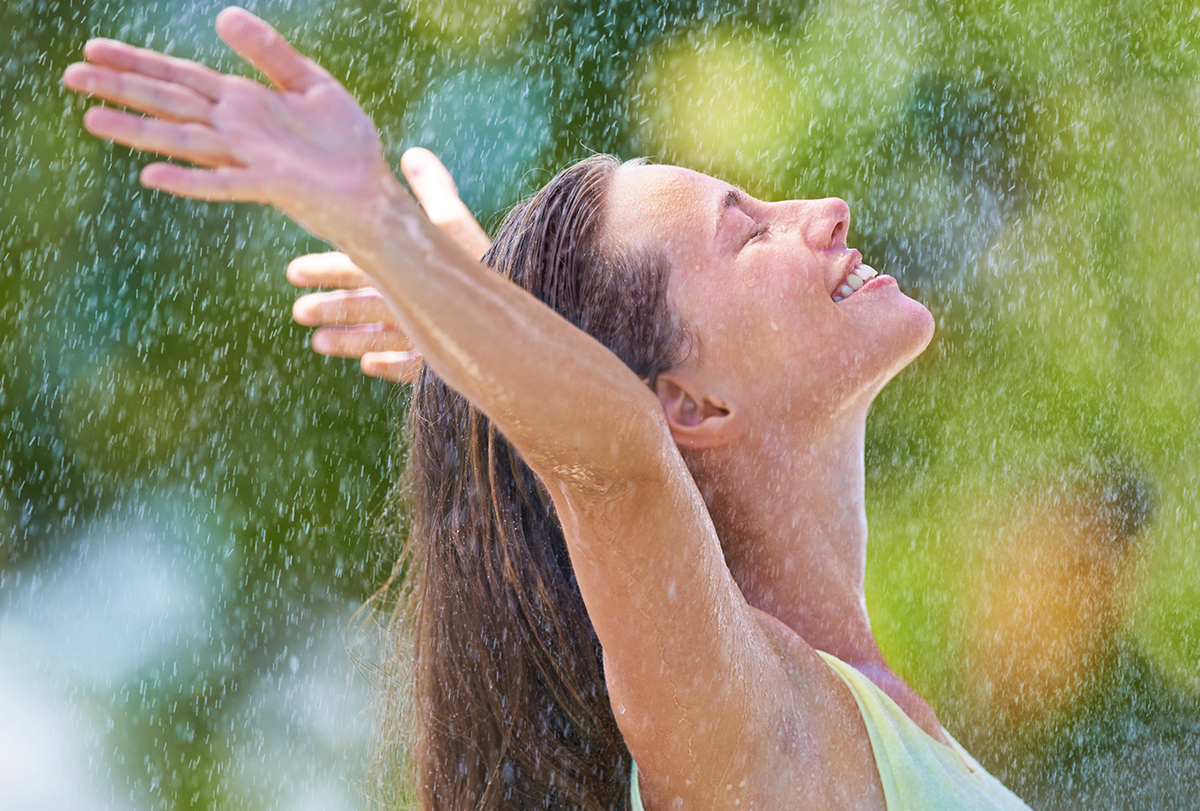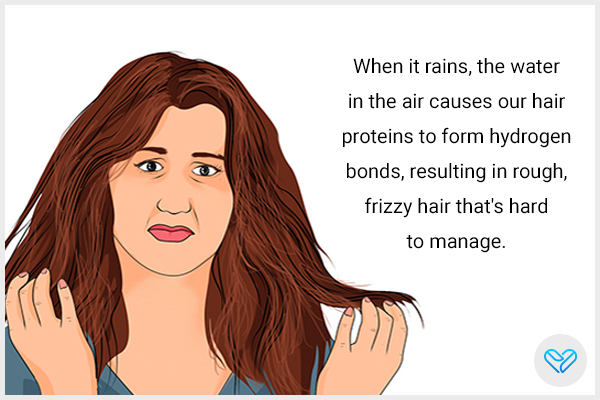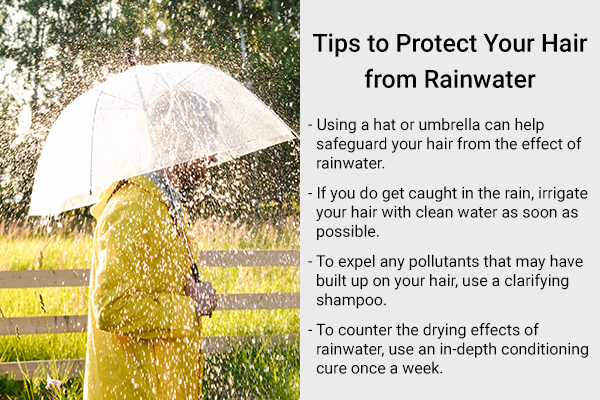In this article:
Getting stuck in the rain or voluntarily going out to the terrace to feel the raindrops against your skin is something many people have experienced in their lives.

However, quickly after enjoying a refreshing dance in the rain, many people run back to their houses to take a “clean water” shower in their washrooms. Why do you think that is?
Well, the simple answer is many people believe that rainwater is not good for your hair and hence needs to be washed away with clean water as soon as possible.
But have you ever wondered how rainwater actually affects your hair?
It is true that, unlike tap water that goes through proper filtration and other cleaning treatments, (1) rainwater is not dealt with in the same way before reaching your locks. This means that there could be potential pollutants and contaminants in the rainwater, especially in areas with high air pollution, making it bad for the hair. (2)
In short, the chances of rainwater being harmful to your hair are pretty high. However, how polluted or unclean rainwater can be varies depending on the atmospheric conditions in your area. If you live in a region with high pollution, it is best to avoid rainwater baths.
This article will analyze the impact of rainwater on your hair and provide you with all the information you need to know before deciding whether rainwater is good for you or not.
Why Is Rainwater, Most of the Time, Not Good for Your Hair?
Dealing with wet and tangled hair can be a real nuisance, particularly when you’re caught in the rain. The bad news is, in addition to being a bother, rainwater can sometimes actually be bad for your hair, and here are the reasons.
1. May have pollutants
According to dermatologists, rainwater is generally safe for hair as long as it is clean and free from pollutants. However, usually this may not be the case as there is always some pollution or environmental contamination in many areas.
If rainwater contains various pollutants such as lead and particulate matter, (3) it can further damage your hair and scalp. The contaminants in polluted rainwater can lead to scalp irritation and inflammation, which can cause hair loss. (4)
Additionally, prolonged exposure to polluted rainwater can cause the hair to become weak, leading to breakage and split ends.
2. May cause frizzy hair

For most people, rainy days mean bad hair days. And if you have dry hair, it can be even worse because it tends to be more porous. (5)
When it rains, the water in the air causes the hair proteins to form hydrogen bonds, resulting in rough, frizzy hair that’s hard to manage. The hydrogen bonds cause the hair strands to stick together, making the hair difficult to comb and style. (6)
So, if you’re worried about your hair getting frizzy and unruly during the rainy season, you might want to take some extra steps to protect your hair.
3. May cause tangles
Rainwater can make your hair more prone to tangling and becoming difficult to manage. This is because rainwater can make the outer layer of our hair, called the cuticle, lift up and become rough.
When the cuticle is lifted, individual hair strands can more easily connect and become tangled.
This is especially true if it’s windy outside, as wet hair strands can whip around and become even more tangled.
4. May not be efficient in cleaning hair
Another potential drawback of using rainwater for hair is that it may not be as effective at removing hard water minerals and buildup as other types of water.
Hard water minerals can make your hair look dull and lifeless and also fragile, which means more breakage and damage. (7)
Tips to Protect Your Hair from Rainwater

While you cannot regulate the climate, you can take several actions to safeguard your hair from rainwater harm. Here are some suggestions to keep your hair healthy:
- Using a hat or umbrella can help safeguard your hair from the effects of rainwater.
- If you do get caught in the rain, rinse your hair with clean water as soon as possible.
- To remove pollutants that may have built up on your hair, use a clarifying shampoo.
- To counter the drying effects of rainwater, use a deep-conditioning treatment once a week.
- Upon being exposed to rainwater, avoid the use of hot devices such as hair dryers and flat irons.
- Carry a wide-tooth comb with you to quickly detangle any knots that may form due to the drizzle.
Are There Positive Effects of Rainwater on the Hair?
Truth be told, there are not many positive effects of rainwater on the hair.
However, in some areas with negligible air pollution, rainwater baths can be good for cleansing hair. This is because rainwater, being completely natural, does not undergo any artificial treatments that tap water usually goes through and thus is free from chemicals such as chlorine.
So, if you’re stuck in the rain in a place where the environment is pretty clean and without pollution, feel free to enjoy a quick rain bath.
Most-Asked Questions
Does rainwater affect hair growth?
Rainwater alone does not affect hair growth. However, prolonged exposure to polluted rainwater can damage hair.
Can rainwater be used for washing hair?
Rainwater can be used for washing hair, but it may not be as effective at removing hard water minerals and buildup as other types of water.
Can rainwater make hair dry?
Rainwater can make hair dry, especially if it’s hard water.
Does rainwater make hair frizzy?
Rainwater can make hair frizzy, especially if it’s humid outside.
Is it safe to drink rainwater?
Drinking rainwater is not recommended as it can contain pollutants, bacteria, and other contaminants.
Final Word
Rainwater can sometimes be bad for your hair. It may contain pollutants that can damage your hair and scalp.
Thankfully, there are some easy steps you can take to protect your hair so you can still enjoy the rain without having to worry about your hair. Stay safe and keep your hair healthy!
- Was this article helpful?
- YES, THANKS!NOT REALLY


